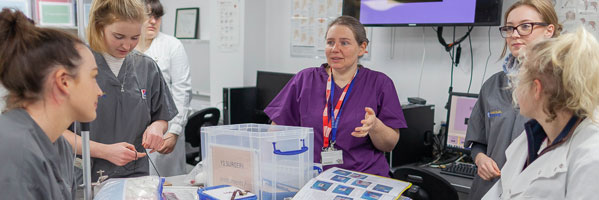8 July 2020
Using evidence in higher education
A desire to increase confidence

Author
Clare Parks
Quality Enhancement Specialist, QAA Scotland
Institutions’ management information systems have been developing rapidly, giving staff access to a growing body of quantitative and qualitative data on student learning and teaching and the wider student experience. The increased use of learning analytics also feeds into the expanding evidence supply chain.
But do our staff feel sufficiently equipped to use evidence effectively in their learning and teaching practice? Or in broader ways to support service and whole-institution strategic developments? Are staff using the right evidence in the right way?
In October 2017, at our launch event for the Enhancement Theme - Evidence for Enhancement: Improving the Student Experience - we asked colleagues what Theme success would look like. They emphasised the desire to increase staff and student confidence in using and presenting evidence, and using evidence to drive change.
Over the three-year duration of the Theme, we have developed a number of resources to help fulfil that ambition. Dr Liz Austen (Sheffield Hallam University) and Professor Stella Jones-Devitt (Staffordshire University) developed the Student Guide to Using Evidence in Higher Education, published in September 2019, which has proved to be one of our most popular Theme resources. The Student Guide has already been widely used by policy makers and academic practitioners who have highlighted its value as a tool to support student understanding of evidence in their academic studies as well as in their student engagement activity. Referenced by the Office for Students and celebrated in popular higher education publications, the well-received and highly regarded Student Guide is now joined by a second edition aimed at supporting staff.
Jim Dickinson, Wonkhe Associate Editor
I can honestly say it’s one of the best things I’ve read on student representation in 25 years.
A guide to the Guides
The premise of the Staff Guide was to retain the underlying structure and content of the student edition, so both would have a familiar look and feel. They also benefit from referencing, and links, to a range of completed Theme resources. The Guides combine theory, activity-based learning and infographics offering a user-friendly experience.
Reflecting on the format and content of the Guides, they make a major contribution to fulfilling the ‘upskilling’ ambitions identified at the start of the Theme, for example, by helping staff and students identify how data/evidence can support enhancement through evidence-based intervention.
Designed to support individuals working on their own or working collectively, the Guides focus on different aspects of evidence use and allow users to apply and test out thinking on key concepts. Case studies point to a range of anticipated
uses and users, from a variety of academic and professional backgrounds such as senior managers, staff delivering learning and teaching and those engaged in professional services.
Using the Guides
In designing the Guides, we envisage the following uses and benefits:
- helping students feel valued and empowered as users of their own data and evidence
- helping colleagues build evidence confidently into the design and evaluation of interventions
- embedding an evidence-informed decision-making approach as regular practice
- encouraging students and colleagues to seek evidence to test what works and what doesn’t
- supporting staff and students working collectively to discuss different approaches, expectations and challenges
- promoting individual upskilling by supporting staff seeking to expand scholarly activities that may help their work towards professional body membership.
As we all continue to learn from disruption, recognising the changing nature of academic life and how this impacts the student experience, the Staff Guide provides colleagues with invaluable guidance and support.
We are undertaking an evaluation of the Guides and would love to hear your experiences of using them. Your feedback will help us to improve content and provide examples to others on how the Guides might be used in new and creative ways. Get in touch with us at ARCadmin@qaa.ac.uk
Shadia el-Mokdad, Access, Participation and Success Officer, Open University in Scotland
An extremely useful resource, the Guide provided a great starting point for both staff and students to engage with how to use data and allowed for reflection on how our institution benefits from the data we gather. The data and evidence planner was invaluable for framing an understanding of how to beneficially map the work we are doing and collect relevant data.
